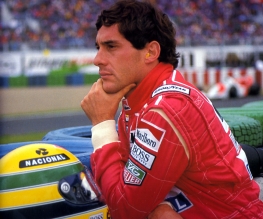Senna

Asif Kapadia’s (The Warrior) documentary on Aryton Senna tells the story of his decade in Formula One, his (terrific) rivalry with Alain Prost, and the philosophy with which he approached racing. Spanning the decade between his entry into F1 and his untimely demise, Senna is an enthralling and heart-rending look at a driver who thrilled audiences around the world with his driving feats, but succumbed to injuries suffered at the San Marino Grand Prix.
[FLOWPLAYER=http://uk.image-1.filmtrailer.com/60654.jpg|http://uk.clip-1.filmtrailer.com/6671_20017_a_4.flv,275,180]
A sign of a good, incisive documentary is when you feel the film could go on for longer and you’d still be interested in what it has to say. With Senna, a spiritual but often aggressive driver, you’re enthralled by the enigma the documentary presents; a man whose brilliance is often matched by his (perceived) recklessness. To borrow an over-used phrase, he’s both a saint and a sinner, who pushed himself to the very top of his profession with his talent and dedication. Kapadia’s documentary doesn’t portray Senna as a man without flaws; he is a conflicting character which makes for an even more compelling look.
What the documentary helps us to understand about Senna is his competitive desire and love for the purity of racing. He talks about this idea frequently, his quotes on that subject bookend the film and provide the image of a man whose desire was to be the best he could possibly be. Part of Senna’s greatness was his talent for being consistent and focused whether it was his handy ability to race in the rain (a truly difficult thing to do), or his win at Interlagos (Brazil Grand Prix) where his gearbox malfunctioned and he had to race in sixth gear for several laps. The documentary depicts a driver with an astonishing will to succeed and a thirst for success that was still there even after his third championship. He’s nothing short of astonishing and his sense of fair play and regard for others shows a level of humanity and humility that we don’t always expect from the drivers of today.
If there is a fault with the documentary then its the way in which Kapadia chooses to briefly skim over areas of his life without much of mention. Relationships he had with women outside of his profession are mentioned but subsequently fade into the background. When we’re presented with another girlfriend on his arm nothing is said about what happened with his previous relationship. In this respect while Kapadia directs our attention to his driving accolades, he slightly short-changes his personal relationships outside of the sport. We hear he was a man who gave millions of dollars to charities before he died, however Senna presents a man known for his racing but shines less of a light on his endeavours outside it. It’s a slight problem but forgiveable since much of the material that Kapadia draws on is compelling enough.
Senna is simply a stunning, complex character that makes for a stellar film. Following the period of his life that prefaced his death, every sentence involving safety or fate is tinged with sadness and regret that the world was robbed of seeing him compete in more races. A valuable insight into a person who was most comfortable driving on the edge, Senna is a testament to the fact that seventeen years after his death, his exploits still draw a huge interest. A captivating and emotional documentary, Senna is not to be missed.





Recent Comments